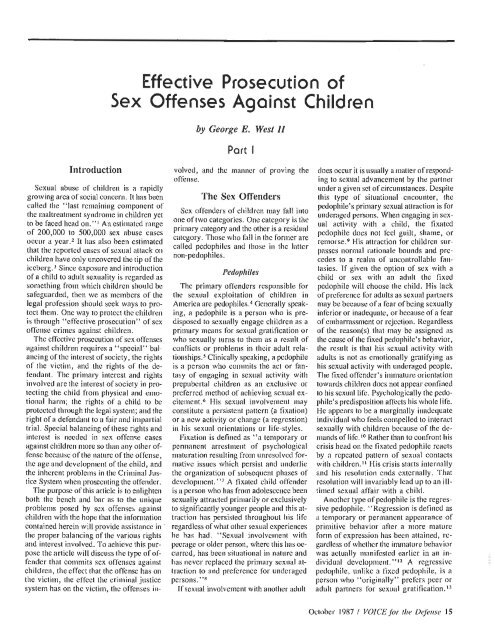OCTOBER D87 - Voice For The Defense Online
OCTOBER D87 - Voice For The Defense Online
OCTOBER D87 - Voice For The Defense Online
You also want an ePaper? Increase the reach of your titles
YUMPU automatically turns print PDFs into web optimized ePapers that Google loves.
Effective Prosecution ofSex Offenses Against Childrenby George E. West I1Part IIntroductionSexual abuse of children is a rapidlygrowing area of social concern. It has beencalled the "last remaining component ofthe maltreatment syndrome in children yetto be faced head on."' An estimated rangeof 200,000 to 500,000 sex abuse casesoccur a year.2 It has also been estimatedthat the reported cases of sexual attack onchildren have only uncovered the tip of thei~eberg.~ Since exposure and introductionof a child to adult sexuality is regarded assomething from which children should besafeguarded, then we as members of thelegal profession should seek ways to protectthem. One way to protect the childrenis through "effective prosecution" of sexoffense crimes against children.<strong>The</strong> effective prosecution of sex offensesagainst children requires a "special" balancingof the interest of society, the rightsof the victim, and the rights of the defendant.<strong>The</strong> primary interest and rightsinvolved are the interest of society in protectingthe child from physical and emotionalharm; the rights of a child to beprotected through the legal system; and theright of a defendant to a fair and impartialtrial. Special balancing of these rights andinterest is needed in sex offense casesagainst children more so than any other offensebecause of the nature of the offense,the age and development of the child, andthe inherent problems in the Criminal JusticeSystem when prosecuting theoffender.<strong>The</strong> purpose of this article is to enlightenboth the bench and bar as to the uniqueproblems posed by sex offenses againstchildren with the hope that the informationcontained herein will provide assistance inthe proper balancing of the various rightsand interest involved. To achieve this purposethe article will discuss the type of offenderthat commits sex offenses againstchildren, the effect that the offense has onthe victim, the effect the criminal justicesystem bas on the victim, the offenses in-volved, and the manner of proving theoffense.<strong>The</strong> Sex OffendersSex offenders of children may fall intoone of two categories. One category is theprimaly category and theother is a residualcategory. Those who fall in the former arecalled pedophiles and those in the latternon-pedophiles.Pedophiles<strong>The</strong> primary offenders responsible forthe sexual exploitation of children inAmerica are pedophile^.^ Generally speaking,a pedophile is a person who is predisposedto sexually engage children as aprimary means for sexual gratification orwho sexually turns to them as a result ofconflicts or problems in their adult relationship~.~Clinically speaking, a pedophileis a person who commits the act or fantasyof engaging in sexual activity withprepubertal children as an exclusive orpreferred method of achieving sexual ex-~itement.~ His sexual involvement mayconstitute a persistent pattern (a fixation)or a new activity or change (a regression)in his sexual orientations or life-styles.Fixation is defined as "a temporary orpermanent arrestment of psychologicalmaturation resulting from unresolved formativeissues which persist and underliethe organization of subsequent phases ofdevelopment."' A fixated child offenderis a person who has from adolescence beensexually attracted primarily or exclusivelyto significantly younger people and this attractionhas persisted throughout his liferegardless of what other sexual experienceshe has bad. "Sexual involvement withpeerage or older person, where this has occurred,has been situational in nature andhas never replaced the primary sexual attractionto and preference for underagedpersons.If sexual involvement with another adultdoes occur it is usually a matter of respondingto sexual advancement by the partnerunder a given set of circumstances. Despitethis type of situational encounter, thepedophile's primary sexual attraction is forunderaged persons. When engaging in sexualactivity with a child, the fixatedpedophile does not feel guilt, shame, orremorse.9 His attraction for children sur-' nasses normal rationale bounds and orecedesto a realm of uncontrollable fantasies.If given the option of sex with achild or sex with an adult the fixedpedophile will choose the child. His lackof preference for adults as sexual partnersmay be because of a fear of being sexuallyinferior or inadequate, or because of a fearof embarrassment or rejection. Regardlessof the reason(s) that may be assigned asthe cause of the fixed pedophile's behavior,the result is that his sexual activity withadults is not as emotionally gratifying ashis sexual activity with underaged people.<strong>The</strong> fixed offender's immature orientationtowards children does not appear confinedto his sexual life. Psychologically the pedophile'spredisposition affects his whole life.He appears to be a marginally inadequateindividual who feels compelled to interactsexually with children because of the demandsof life." Rather than to confront hiscrisis head on the fixated pedophile reactsby a repeated pattern of sexual contactswith children.1' His crisis starts internallyand his resolution ends externally. Thatresolution will invariably lead up to an illtimedsexual affair with a child.Another type of pedoph~le IS the regressivepedophile. "Regression is defined asa temporary or permanent appearance ofprimitive behavior after a more matureform of expression has been attained, regardlessof whether the immature behaviorwas actually manifested earlier in an individualdevel~pment."'~ A regressivepedophile, unlike a fixed pedophile, is aperson who "originally" prefers peer oradult partners for sexual gratification.13October 1987 1 VOICE for the <strong>Defense</strong> 15
















